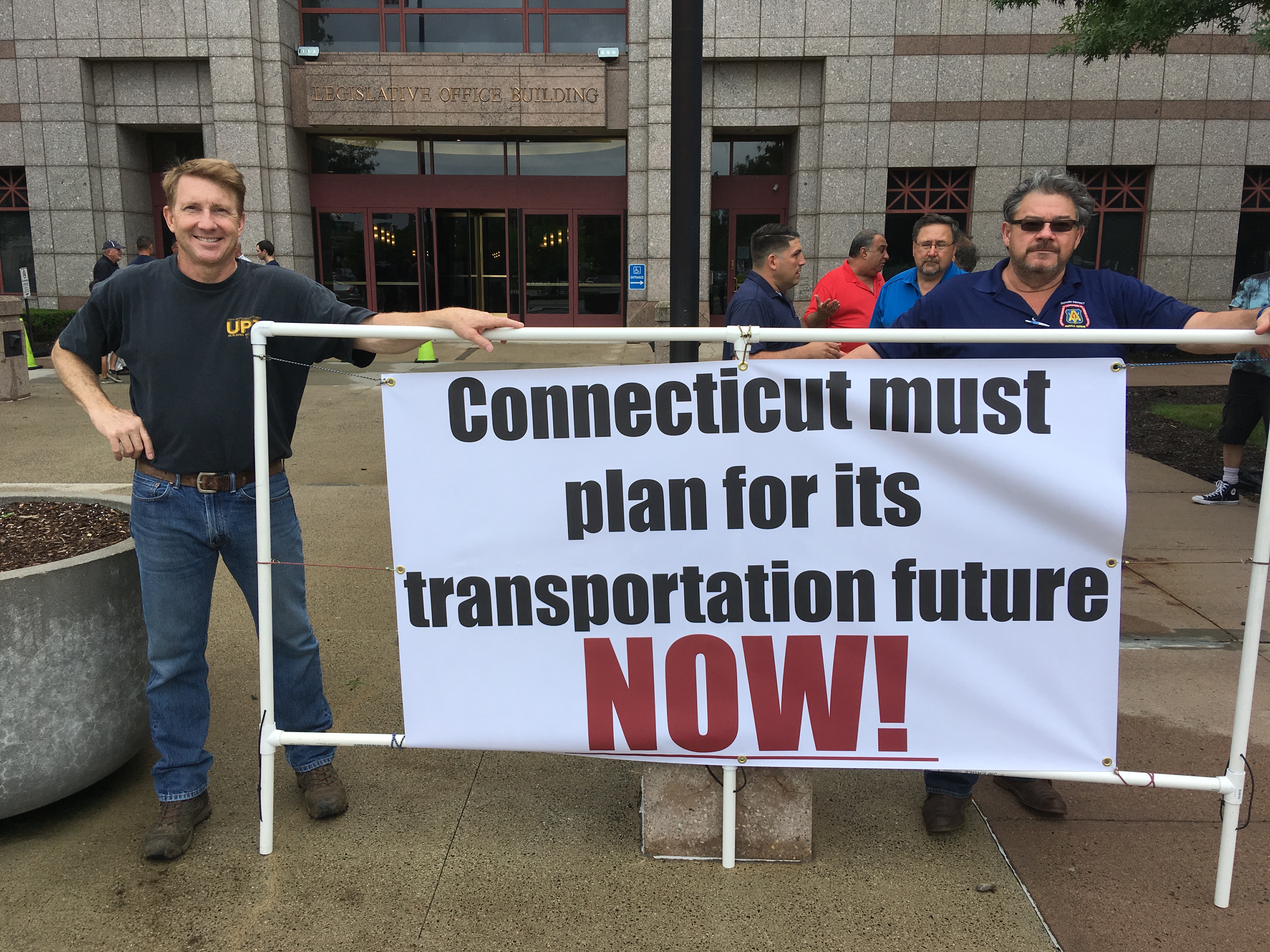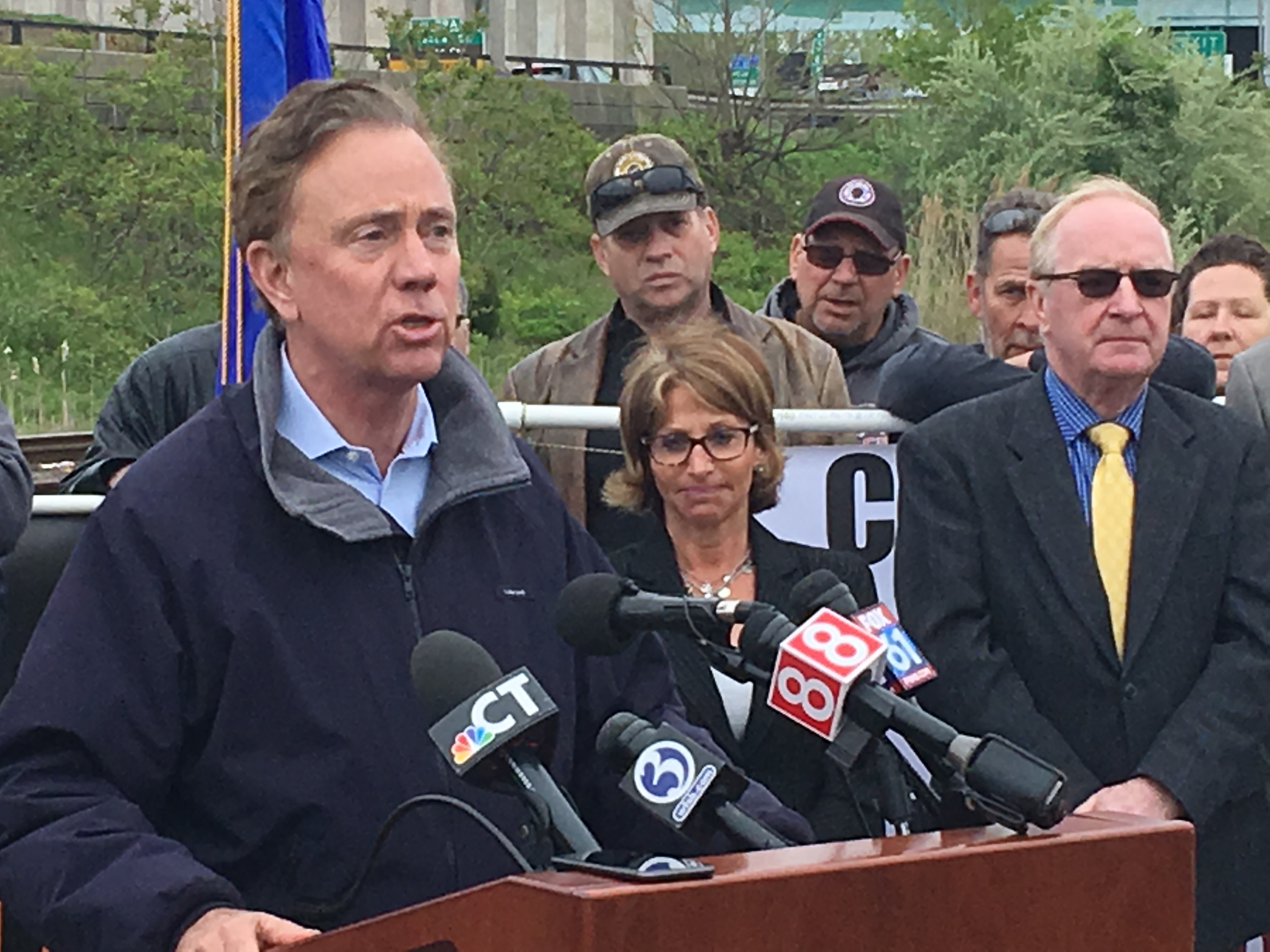
Keith M. Phaneuf :: CTMirror.org
Construction trades union members Martin Alvarenga (right) of Glastonbury and Steve Frantz of Essex rallied outside the Legislative Office Building for more transportation spending last spring.
With Connecticut’s economy reeling from the coronavirus, legislators insist they won’t hike gasoline taxes or impose tolls this summer — even with new projections the transportation program is headed for collapse in just over one year.
But they also concede their ability to postpone that debate likely is measured in months, not years.
In the meantime, Connecticut may have to rely on its reputation — and its great wealth — to secure the financing it needs to continue maintaining its aging highways, bridges and rail lines.
“I think a commitment to do something about the STF [Special Transportation Fund] and a more detailed look at revenues will be at the head of the agenda” when the regular 2021 General Assembly session begins next January, said Senate President Pro Tem Martin M. Looney, D-New Haven.
“We’ve got to give the economy a little time to recover first, but I see the urgency,” said Senate Minority Leader Len Fasano, R-North Haven.
Gov. Ned Lamont outlined the urgency last week when he and the legislature’s nonpartisan fiscal analysts noted the STF — the portion of the budget that pays off borrowing for infrastructure repairs — runs out of cash in the fiscal year beginning July 2022.
And Office of Policy and Management Secretary Melissa McCaw, Lamont’s budget director, said the crisis could even come 12 months sooner, if Connecticut maintains its current effort to begin reversing decades of deferred maintenance.
That backlog, coupled with 20 years of stagnant fuel tax revenues, created a system headed for collapse. COVID-19 simply sped up the timetable.

Ryan Caron King :: CT Public Radio
Protesters lined Capitol Avenue in March of 2019 to make their opinions known about Gov. Ned Lamont’s tolling plan, which he abandoned after 14 months.
Lamont, who spent his first 14 months in office unsuccessfully urging lawmakers to adopt tolls, hinted last week he would consider boosting fuel taxes.
But lawmakers who will return to the Capitol in late June — public health standards permitting — to whittle down a deficit in the overall budget, said any kind of tax hike now is off the table.
“Honesty, I think all of these discussions are premature,” said House Majority Leader Matt Ritter, D-Hartford, who remains hopeful Congress will break its partisan gridlock and approve substantial stimulus for budgetary relief for states and municipalities. “Until I know what the feds are going to do to help states, I really don’t have an answer” to other state budget proposals.
Tolls remain taboo
Even more certain, on- and off-the-record sources say, is that tolls won’t be up for discussion this year or next.
“For now I think we’ve moved past that,” Looney said.
House Minority Leader Themis Klarides, R-Derby, who has consistently opposed tolls, agreed.
“We’re in a place now where we have to re-prioritize everything,” Klarides said, adding that “the answer is not to take money out of people’s pockets continuously.”
But even if Congress orders a major state-municipality relief package — and especially if tolls are off the table — Connecticut may need more revenue from the gas pumps.
New projections last week showed Connecticut’s record-setting $2.5 billion reserve will be gone one year from now.

Senate Minority Leader Len Fasano, R-North Haven, and House Minority Leader Themis Klarides, R-Derby, have remained staunch opponents of tolls. In this April 2019 photo, they are testifying in opposition to the governor’s plan during a finance committee hearing.
More importantly, revenues for the budget’s General Fund — which covers about 90% of expenses — are expected to be down $4.3 billion in the next, two-year state budget.
Lamont and legislators will have their hands full keeping that in balance and likely won’t be able to spare any General Fund resources to keep transportation afloat.
STF is insolvent by mid-2021
That means Lamont and legislators will have enough trouble keeping the General Fund in balance, and won’t be able to shift resources from that to beef up transportation.
Meanwhile, projected deficits in the $1.7 billion Special Transportation Fund should consume all reserves there by mid-2021 — and continue piling up red ink for three more fiscal years.
Compounding matters, state officials have few options to cut transportation spending. Besides covering debt costs, the STF also funds an under-staffed Department of Transportation and public transit programs that already can’t keep pace with demand for service.
Delaying projects that already have been stalled for years would weaken the construction industry and ultimately break the transportation program, said Donald Shubert, president of the Connecticut Construction Industry Association.
“At the pace we’re going right now, Connecticut is still falling farther behind at maintaining a state of good repair,” Shubert said, adding that construction inflation and highway and bridge deterioration take a heavy toll. “We already know that every $1 of deferred maintenance costs $4 to $5 in future construction expenses.”

Gov. Ned Lamont discusses the need to boost the state’s transportation funding in front of a construction site on I-91 in Hartford last May.
The Special Transportation Fund’s chief revenue sources include a share of the sales tax — which has been battered in the current economy — and the retail and wholesale fuel taxes, which haven’t fared much better.
But state officials hope that once residents return to work, gasoline sales — and thereby tax receipts — will increase as well. But those increases already are factored into projections that still show the transportation fund going belly up in the summer or fall of next year.
Connecticut’s two gasoline taxes combined added about 40 cents per gallon to the price of gas when 2020 began, ranking the state 11th-highest in the nation, according to the American Petroleum Institute.
During a televised briefing last Friday, Lamont noted some states are looking at gasoline tax increases “given the low price of gasoline” before he abruptly interrupted himself and dropped the subject. “Let me hear the ideas from the legislature.”
But even though lawmakers aren’t ready to talk about gasoline tax increases now, there’s another reason they can’t wait too long.
Wall Street is watching closely
Connecticut borrows the money for highway, bridge and rail upgrades by selling bonds on Wall Street. And that process traditionally relies heavily on Connecticut demonstrating a healthy revenue-to-debt ratio.
More specifically, investors like to see twice as much revenue flowing into the STF as debt payments going out — for the current year and for four years into the future.
State Treasurer Shawn Wooden has said he intends to issue $850 million in bonds later this month for transportation.
Can Connecticut still secure an attractive interest rate with new projections that show our revenue-to-debt ratios barely meet the traditional standard — and could fail if the economy slips more?
Wooden remained cautiously optimistic that investors still want to buy Connecticut’s bonds. That stems both from Connecticut’s constitutional mandate to balance its budget, and its fiscally strong position relative to other states.
“The impact of the COVID-19 pandemic is being felt across the nation in state and local budgets alike, and Connecticut’s Special Transportation Fund is no exception,” Wooden said, adding he is keeping a close watch on state revenues. “We are in close communication with our financial advisors and the senior bond underwriter as we continue to monitor market conditions.”
But Rep. Jason Rojas, D-East Hartford, co-chairman of the tax-writing, Finance, Revenue and Bonding Committee, said Connecticut policymakers face a choice — soon — about how to fund transportation. And neither the bond markets nor potential aid from Washington will change that.
“Anything Congress does would be of great help and assistance,” he said, “but I don’t think they’re going to absolve the states of all of their financial problems.”
"can" - Google News
May 06, 2020 at 04:02PM
https://ift.tt/3dq63Ip
CT can delay its transportation financing debate only a few months more - The CT Mirror
"can" - Google News
https://ift.tt/2NE2i6G
https://ift.tt/3d3vX4n
Bagikan Berita Ini














0 Response to "CT can delay its transportation financing debate only a few months more - The CT Mirror"
Post a Comment